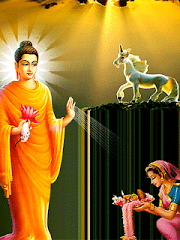

| 23. World Peace. In the Buddha's Teaching the highest emphasis is laid on the law of cause and effect, or the conditionality of all mundane phenomena. Greed, hatred and delusion are the chief causes that lead to unsatisfactoriness in the world. If one seeks to escape from this state of dissatisfaction one should try to get rid of the underlying craving and anger or hatred due to ignorance of the true nature of things. War is diametrically opposed to peace. Conflict is due to the various malignant motives stagnating in the minds of men. The control of such thoughts as greed, jealousy, hate and so on will certainly lead to peace. Permanent peace will only come when one has completely eradicated these mental defilements. Wars will cease and peaceful dialogue between individuals will lead to a world of peaceful and harmonious living. Petty squabbles arose between the farmers on both sides of the river Rohini which served as the boundary between the Sakyan and the Koliyan Kingdoms, as each side tried to divert as much water as possible to their fields. Finally these led to a major confrontation of the two armies. The Buddha arriving on the scene exhorts them on the calamitous results of war and the advantage of arriving at a peaceful settlement. Thus war is averted and peace restored. It should be mentioned that the Buddha has been the only religious teacher to have visited a battlefront in person and acted as a true mediator in averting war. |

| 22. Administration of Justice. Certain statutes regarding the administration of justice, were set up by the Buddha for the benefit of bhikkhus, in order to facilitate the dispensation of moral justice according to sound judgment, whenever the occasion arose. By this act the Buddha ensured that the spirit of moral justice which enables us to interpret laws correctly, unlike the imperfect expression of certain aspects of our present day legal administration. At the time of the Buddha and even later, there were kings who took advantage of, and made use of these laws to supplement their own. The judicial procedure adopted by the Buddha is clearly illustrated in the case of the Arahant Theri Kumara-Kassapa's mother, who unaware of her pregnant condition, with her husband's consent left her home and entered the Bhikkuni order. Later, finding her in an advanced state of pregnancy, the bhikkuni was charged with a serious allegation of misconduct and summoned before a religious court of appeal. The Buddha ordered Upali Thera, foremost among His Arahant disciples in knowledge of Vinaya matters, (and thus equal to that of the Chief Justice of to-day), to preside, try the innocent victim and to deliver judgment on her. The audience consisted of bhikkhus, bhikkunis and laymen, including the lay-woman Visakha. She screened the victim from the presence of the Buddha and the rest, after careful examination and intimate questioning declared that she was quite innocent. The Arahant Upali on hearing the evidence absolved the bhikkuni of any transgression. |

| 21. Buddhist Education. It is a method of teaching that is based on the mental development of the individual: The primary object of Buddhist Education is to produce a cultured disciplined and educated society. With that object in view the first university to be established in the world was at Nalanda in India. It is reported that over ten thousand well disciplined, cultured and law abiding students had their education there in addition to the numerous lecture halls found there classes were also held in the open air under the cooling shade of trees. |
| 20. Buddhist Economic System. Many who are not familiar with the Buddha's Teaching classify it as a religion for the next world, or for a future life. They are completely mistaken in this, because eighty percent of the objectives included in the Buddha's Teaching are for the world of today. According to the Buddha all except one of the five blessings that accrue to the virtuous are available in this life itself; ten of the eleven benefits obtainable through the development of Metta (loving-kindness) are immediate. One who leads a good life in this world is certain to be happy in the next. The Buddha emphasises this in His Teachings. Thus the Buddha who taught the way to the cessation of suffering also pointed out the path to a highly satisfactory way of life on earth. One aspect of this mundane progress refers to an economic system based on Buddhist principles with the objective of economic development together with the elimination of poverty. The Buddha defines righteous employment as engagement in agriculture, trade, dairy farming, defence services, government services and professional services. He prohibited trade in weapons, in slaves, in rearing animals for slaughter, in liquor, and in poisons, drugs and narcotics. |


.gif)




ไม่มีความคิดเห็น:
แสดงความคิดเห็น